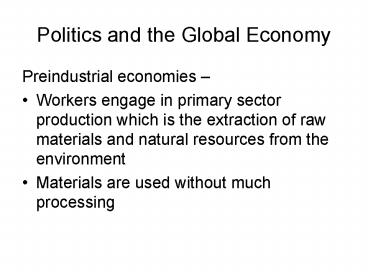Politics and the Global Economy - PowerPoint PPT Presentation
1 / 16
Title:
Politics and the Global Economy
Description:
Technology is based on programmable automated machines that a allow a variety of ... Ordinary people influence public policy thru voting & special interest groups ... – PowerPoint PPT presentation
Number of Views:20
Avg rating:3.0/5.0
Title: Politics and the Global Economy
1
Politics and the Global Economy
- Preindustrial economies
- Workers engage in primary sector production which
is the extraction of raw materials and natural
resources from the environment - Materials are used without much processing
2
Politics and the Global Economy
- Industrial economies
- Workers engage in secondary production which is
the processing of raw materials into finished
products - Deindustrialization capital is diverted from
investment in basic industries to business
practices such as mergers and acquisitions and
foreign investments
3
Politics and the Global Economy
- Postindustrial economies-
- Workers are involved in tertiary sector
production which is providing services rather
than goods as the primary source of livelihood - The US is an advanced industrial society
- We have a small sector of primary production,
large manufacturing sector a growing service
sector
4
Politics and the Global Economy
- Flexible production (post-Fordism)
- Technology is based on programmable automated
machines that a allow a variety of products or
models to be produced w/o downtime or retooling - Factories are organized so that workers are
rotated thru a variety of tasks, usually as a
team - Factories subcontract activities that they cannot
easily or cheaply perform to other companies
that can (subcontracting)
5
Politics and the Global Economy
- Socialism public ownership of the means of
production, the pursuit of collective goals
centralized decision making - The primary motivation for economic activity is
the collective good of all citizens - Democratic socialism private ownership of the
means of production, the government is very
involved
6
Politics and the Global Economy
- Capitalism
- Private ownership of production
- Pursuit of personal profit
- Competition
- Lack of government intervention (laissez-faire
policy also called free enterprise
7
Politics and the Global Economy
- Transnational corporation a large-scale
business organization that is headquartered in
one country but operates in many countries which
has the legal power (separate from individual
owners or shareholders) to enter into contracts,
buy sell property, and engage in other business
activity
8
Politics and the Global Economy
- Economic concentration just a few individuals
or corporations control the vast majority of all
economic resources in a country - Before the Civil War about 200 families
controlled the US economy, this gradually shifted
from families to corporations
9
Politics and the Global Economy
- Monopoly a single firm controls an industry
accounts for all sales in a specific market - Oligopoly a small number of companies or
suppliers control an entire industry or service - Conglomerate combination of businesses in
different commercial areas which are owned by one
holding company
10
Politics and the Global Economy
- Interlocking corporate directorates members of
the board of directors of one corporation also
sit on the board of one or more corporations - Clayton Antitrust Act of 1914 illegal for a
person to sit on the boards of directors of two
corporations that are in direct competition with
each other at the same time
11
Politics and the Global Economy
- Corporate welfare the government helps
industries private corporations in their
economic pursuits
12
Politics and the Global Economy
- Functionalist perspective (pluralism) -
- Political leaders make decisions thru a process
of bargaining, accommodation and compromise - Leadership groups protect people from the abuses
of any one group - Ordinary people influence public policy thru
voting special interest groups
13
Politics and the Global Economy
- Power is widely dispersed in society
- Public Policy reflects a balance among competing
interest groups which is not necessarily the
majority groups view
14
Politics and the Global Economy
- Conflict perspective (elite model)
- Elites possess the greatest wealth, education,
status other resources make the most
important decisions for society - Elites generally agree on the basic values
goals for the society
15
Politics and the Global Economy
- Power is highly concentrated at the top of a
pyramid-shaped social hierarchy those at the
top set public policy for everyone - Public policy reflects the values preferences
of the elite, not of ordinary people - Elites use the media to shape the political
attitudes of ordinary people
16
Politics and the Global Economy
- The corporate rich influence the political
process in three ways - Financing campaigns of candidates who favor their
causes - Using PACs loophole contributions to obtain
favors, tax breaks favorable regulatory rulings - Gaining appointment to governmental positions































